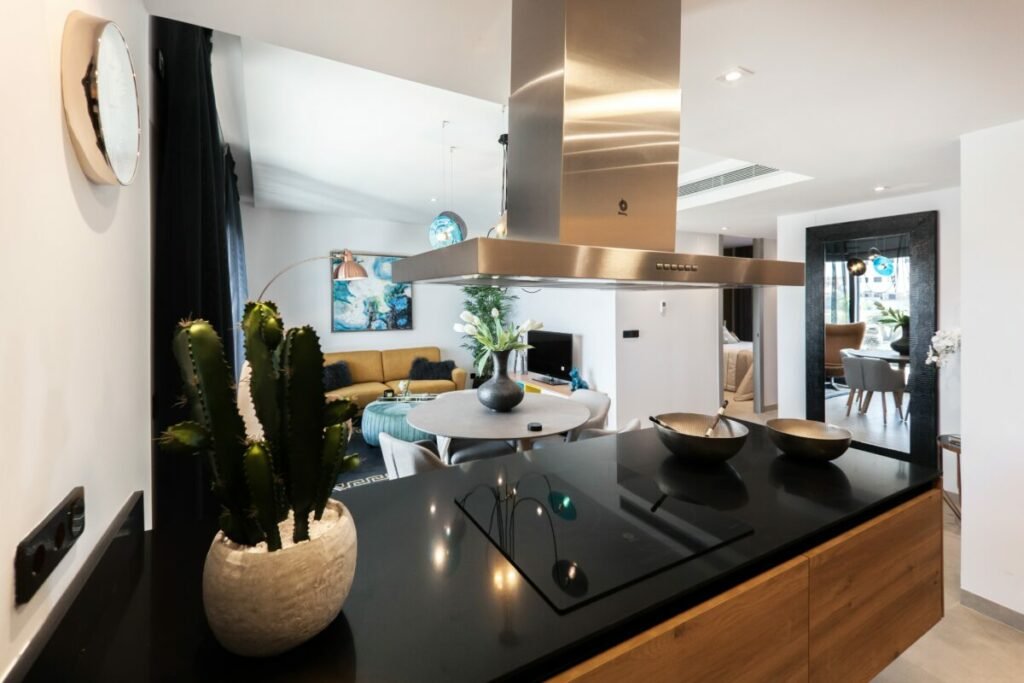
The kitchen is new to her, its wide granite island, so big you could autopsy a moose on it. More cabinet space than she’d had in all her previous kitchens combined, and then some. A Viking range. A hot water tap. Ice and water through the door in the refrigerator. Although her contributions were meager by comparison, they merged kitchen tools. Her KitchenAid mixer; her mixing bowls; his Cuisinart food processor; his silverware set.
Chili is simmering in an enameled pot on the stove. Cornbread bakes in the oven. Her own work day finished, Sarah and Ralph the dog wait for Sam to return from the office.
The relief of letting go of the mortgage her ex-husband left her, of shedding that month-to-month panic of making enough as a freelance writer to stay afloat, to keep the house, to maintain the appearance of an independent woman, was overwhelming. After she moved in with Sam, she felt lighter every day. She moves about the kitchen, rinsing the cutting board, putting away the spices, loading the dishwasher.
Ralph has settled in tentatively. As long as Sarah is in sight, he’s OK. She considers him now as she shreds cheddar cheese into a bowl. “Cheese tax?” she says, and he sits at her feet, lifting his shaggy head to accept the gift.
The phone rings and Sarah answers, pings of foreboding sounding in her head.
Her mother lives a thousand miles away, has only met Sam once, and is firmly against people who are unmarried living together. Even fifty-year-olds.
Sarah knows her mother remembers the first apartment Sarah, a pregnant teen bride, lived in, its shabby carpet, the thin walls, the neighbors dealing drugs and getting arrested in the parking lot.
Her mother remembers the house Sarah and her first husband finally bought after scrimping and saving, its tiny rooms, the vinyl siding, the unfinished basement.
When Sarah’s ex left, soon after their daughter started college, her mother asked Sarah several pointed questions.
“Did you date your husband?” Translation: were you having sex?
“Did you wear something nice and put on lipstick before he came home from work?” Translation: did you let yourself go?
“Did you try counseling?” Translation: what did you do to drive him away?
Several times, Sarah had to say, “Mom, I’m hanging up now. This isn’t my fault.”
Funny enough, Sarah had tried all those things, including the lipstick, even though she worked at home.
And then, finally, two years post-divorce, she met Sam, who, over nachos on their seventh date, said, “I am not saying this to brag, but I make so much more money than you. If we’re going to keep doing this, you should really let me pay.”
And she had, because, as she learned, he really does make a ludicrous amount more than she. And so, they continued to see one another for years, falling truly, deeply in love. They shared a fondness for breakfast in diners; of hiking in the woods on even the coldest of days; and pots of dark roast coffee made in a French press, drunk out of ceramic mugs in front of the fireplace. Then, one Christmas, Sam asked Sarah if she’d given any thought to the two of them living together.
And Sarah had. Especially on those nights when she awoke in a sweat, heart pounding, realizing that if a check didn’t come in the mail that day, she was going to have to do some shuffling of funds to make sure the bills got paid. She sold the shabby house, banking the profit, and moved in with Sam by the fall of the following year.
Now that Sarah’s been living there for a few weeks, her mother is asking, “What is the house like?” and Sarah tries to describe it; the garden out back, the art on the walls, the kitchen. As she talks, Sam comes in, and seeing her on the phone, gives her a quiet kiss on the cheek, then leans down to ruffle Ralph’s ears, his fuzzy head. Sarah smiles at him, and mouths “Mom.” Sam nods, then points and wildly gestures his enthusiasm for the chili before going upstairs to change out of his work clothes, Ralph dancing around him all the way.
“It’s two stories, four bedrooms,” Sarah says, returning her attention to her mother and feeling like a real estate agent. “It’s very nice, Mom. He had it built five years ago. The kitchen is huge. Very modern.”
“Are you paying him rent? Because I think you should pay him rent.” Translation: you are a whore.
And Sarah pauses, oven mitt on her right hand, then pulls open the oven door, a blast of heat fogging her glasses, the scent of fresh cornbread filling the room. Ralph, summoned by the smell, returns to the kitchen, paws tapping on the hardwood floor.
She takes off the oven mitt before pressing the button to hang up the phone. She hopes it will be for the last time. Ralph presses his body against her legs, ready as always to absorb her grief.


Share this post with your friends.

